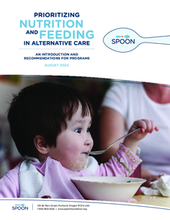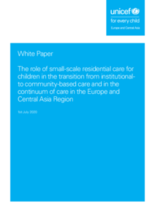Displaying 201 - 210 of 1469
This qualitative study, conducted in four child and youth care centres in the Tshwane region of South Africa, presents some techniques used by child and youth care workers to develop belonging.
The attitudes of staff working in residential care towards trauma-informed care were measured prior to the implementation of The Sanctuary Model, an organisation-wide model and 6- months post implementation.
This paper draws upon lessons from SPOON Foundation's work in 17 countries since 2008, summarizing the main nutrition considerations for children in alternative care and offering recommendations on integrating nutrition and feeding practices into alternative care programs. This paper also explores ways that nutrition can support the global movement to ensure every child has family-based care, while meeting the immediate needs of the millions of children currently in all types of alternative care.
Qualitative research based on a multiple‐case study was designed and carried out in Spain with the aim of deepening the understanding of the individual school experiences of three children in residential care.
This article reports on a study of children's experiences of being physically restrained by staff in a range of custodial settings, including Local Authority Secure Children's Homes, in the UK.
This preliminary scoping study aimed to explore approaches to family partnering within Australian therapeutic residential care (TRC), along with elements of best practice.
The objective of this study was to explore the effects of previous maltreatment on current self-representations (i.e., the attributes used to describe oneself) of youth in residential care and the moderating role of gender, age, number of previous placements and length of placement in residential care.
This article describes the psychosocial resilience processes that facilitate successful transitioning of young women as they journey out of residential care towards young adulthood.
This White Paper summarizes evidence on the current use and impact of small-scale residential care (also: ‘SSRC’) and offers guidance on how to enable all children to grow up in a loving and stable family environment. It aims to promote better decisionmaking among policy-makers, local governments, non-governmental organizations (NGOs), as well as child welfare and other, allied practitioners of the establishment.
This care system assessment is intended to support the Government of Kenya to assess and strengthen the national, formal care system.



